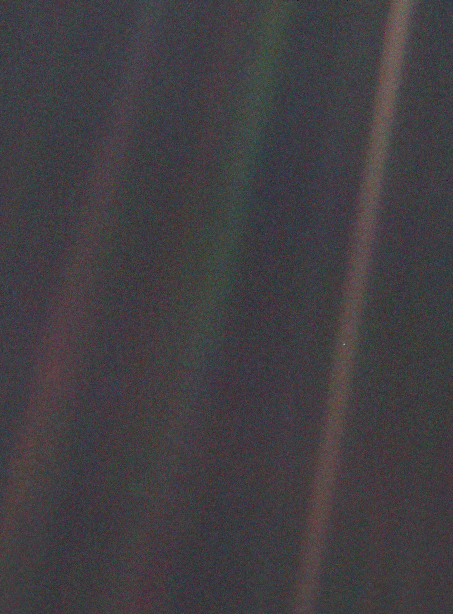There is a place called home. It is the only home we have ever known. It is our planet Earth. Earth - Home to all forms of life. We, the humans, constitute a tiny tiny part of the diversity. Yet, it is we who are causing the biggest impact on the planet.
Through our actions, inactions, mistakes and ignorance, we are destroying it. It is not a slow death by any means. Nature is dying. With it's death, the environment we have so long been used to will change, accelerating the extinction of life forms which thrive in these conditions. When nature goes, so will man.
At the twilight of our existence, I want to quote Carl Sagan's profound message about the Pale Blue Dot our dear Home (see that tiny blue dot caught in the picture of the sun beam taken by Voyager from 6 Billion kilometers)
"From this distant vantage point, the Earth might not seem of particular interest. But for us, it's different. Consider again that dot. That's here, that's home, that's us. On it everyone you love, everyone you know, everyone you ever heard of, every human being who ever was, lived out their lives. The aggregate of our joy and suffering, thousands of confident religions, ideologies, and economic doctrines, every hunter and forager, every hero and coward, every creator and destroyer of civilization, every king and peasant, every young couple in love, every mother and father, hopeful child, inventor and explorer, every teacher of morals, every corrupt politician, every "superstar," every "supreme leader," every saint and sinner in the history of our species lived there – on a mote of dust suspended in a sunbeam. 
The Earth is a very small stage in a vast cosmic arena. Think of the rivers of blood spilled by all those generals and emperors so that, in glory and triumph, they could become the momentary masters of a fraction of a dot. Think of the endless cruelties visited by the inhabitants of one corner of this pixel on the scarcely distinguishable inhabitants of some other corner, how frequent their misunderstandings, how eager they are to kill one another, how fervent their hatreds.
Our posturings, our imagined self-importance, the delusion that we have some privileged position in the Universe, are challenged by this point of pale light. Our planet is a lonely speck in the great enveloping cosmic dark. In our obscurity, in all this vastness, there is no hint that help will come from elsewhere to save us from ourselves.
The Earth is the only world known so far to harbor life. There is nowhere else, at least in the near future, to which our species could migrate. Visit, yes. Settle, not yet. Like it or not, for the moment the Earth is where we make our stand."
